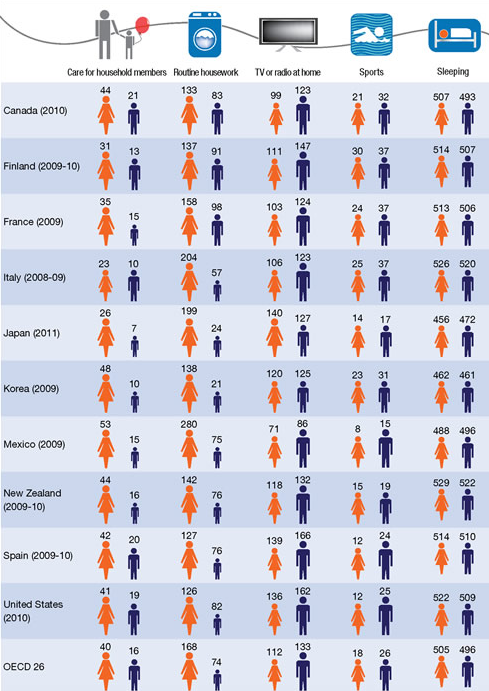Image credit: OECD.org and The Atlantic
All over the world, women are doing work they’re not getting paid for. In rich countries, it might be folding the laundry or staying home to take care of a sick child. In developing countries, unpaid labor tends to be more physically arduous, like hauling water and chopping wood. Wherever you are, it’s considered women’s work.
Melinda Gates picked up on this disparity in her travels throughout the world. Every year, she and her husband, Bill Gates, write a letter outlining their philanthropic priorities. This year, she devoted her portion of the letter to the burdens of unpaid work on women.
“Unless things change, girls today will spend hundreds of thousands more hours than boys doing unpaid work simply because society assumes it’s their responsibility,” she writes in the letter, which is written for a teenage audience.
According to the OECD and other sources, women devote more time than men to chores in nearly every country. American women spend more than two hours daily on chores, compared to just 82 minutes for men. Even in Finland, a country that seems more progressive on gender issues, women sweep, scrub, and change diapers for 137 minutes daily, and men do for just 91.
“It ends up robbing women of their potential,” Gates said in an interview. “This is a societal issue that in 2016 shouldn't exist anymore.”
According to Gates, “globally, women spend an average of 4.5 hours a day on unpaid work. Men spend less than half that much time.” The unpaid labor gap is especially large in poor countries. “In India, to take one example, women spend about six hours, and men spend less than one hour,” she writes.
And when women are too busy cleaning and cooking, they have less time for paid work. Girls in many countries fall behind in school because they're swamped with tedious chores. Gates writes that reducing women’s unpaid labor from five hours per day to three can increase a country’s female labor-force participation rate by 10 percent. If women participated in the economy at the same levels as men, she writes, global GDP could increase by 12 percent.
The other portion of the letter this year—Bill’s half—concerns the need for new and reliable forms of clean energy. Melinda Gates told me energy can also play a role in fixing the female time-poverty problem, particularly in the developing world. Given all the hours women in developing countries spend collecting water, for example, “if women had access to clean water, it changes everything about their time.” She says new types of stoves and other inventions could also help.
At the national level, she recommends stronger family—not “maternity”—leave policies, as well as more resources devoted to women’s health.
Read the rest of the story here.
News story from The Atlantic.

